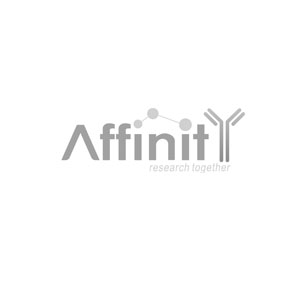产品描述
*The optimal dilutions should be determined by the end user.
*Tips:
WB: 适用于变性蛋白样本的免疫印迹检测. IHC: 适用于组织样本的石蜡(IHC-p)或冰冻(IHC-f)切片样本的免疫组化/荧光检测. IF/ICC: 适用于细胞样本的荧光检测. ELISA(peptide): 适用于抗原肽的ELISA检测.
引用格式: Affinity Biosciences Cat# AF0534, RRID:AB_2834237.
展开/折叠
FLJ39654; FRTS4; Hepatic nuclear factor 4 alpha; Hepatocyte nuclear factor 4 alpha; Hepatocyte nuclear factor 4; Hepatocyte nuclear factor 4-alpha; HNF 4 alpha; HNF 4; HNF-4-alpha; HNF4; HNF4A; HNF4A_HUMAN; HNF4a7; HNF4a8; HNF4a9; Hnf4alpha; HNF4alpha10/11/12; MODY 1; MODY; MODY1; NR2A1; NR2A21; Nuclear receptor subfamily 2 group A member 1; OTTHUMP00000031060; OTTHUMP00000031062; TCF 14; TCF; TCF-14; TCF14; Tcf4; Transcription factor 14, hepatic nuclear factor; Transcription factor 14; Transcription factor HNF 4; Transcription factor HNF-4; Transcription factor HNF4; Hepatocyte nuclear factor 4 gamma; Hepatocyte nuclear factor 4-gamma; HNF 4 gamma; HNF-4-gamma; Hnf4g; HNF4G_HUMAN; NR2A2; NR2A3; Nuclear receptor subfamily 2 group A member 2;
抗原和靶标
Expressed in pancreas, kidney, small intestine and testis. Weakly expressed in colon. Not expressed in liver, skeletal muscle, lung, placenta, brain, heart, peripheral blood, ovary, prostate, thymus and spleen.
- P41235 HNF4A_HUMAN:
- Protein BLAST With
- NCBI/
- ExPASy/
- Uniprot
MRLSKTLVDMDMADYSAALDPAYTTLEFENVQVLTMGNDTSPSEGTNLNAPNSLGVSALCAICGDRATGKHYGASSCDGCKGFFRRSVRKNHMYSCRFSRQCVVDKDKRNQCRYCRLKKCFRAGMKKEAVQNERDRISTRRSSYEDSSLPSINALLQAEVLSRQITSPVSGINGDIRAKKIASIADVCESMKEQLLVLVEWAKYIPAFCELPLDDQVALLRAHAGEHLLLGATKRSMVFKDVLLLGNDYIVPRHCPELAEMSRVSIRILDELVLPFQELQIDDNEYAYLKAIIFFDPDAKGLSDPGKIKRLRSQVQVSLEDYINDRQYDSRGRFGELLLLLPTLQSITWQMIEQIQFIKLFGMAKIDNLLQEMLLGGSPSDAPHAHHPLHPHLMQEHMGTNVIVANTMPTHLSNGQMCEWPRPRGQAATPETPQPSPPGGSGSEPYKLLPGAVATIVKPLSAIPQPTITKQEVI
- Q14541 HNF4G_HUMAN:
- Protein BLAST With
- NCBI/
- ExPASy/
- Uniprot
MNTTDNGVNCLCAICGDRATGKHYGASSCDGCKGFFRRSIRKSHVYSCRFSRQCVVDKDKRNQCRYCRLRKCFRAGMKKEAVQNERDRISTRRSTFDGSNIPSINTLAQAEVRSRQISVSSPGSSTDINVKKIASIGDVCESMKQQLLVLVEWAKYIPAFCELPLDDQVALLRAHAGEHLLLGATKRSMMYKDILLLGNNYVIHRNSCEVEISRVANRVLDELVRPFQEIQIDDNEYACLKAIVFFDPDAKGLSDPVKIKNMRFQVQIGLEDYINDRQYDSRGRFGELLLLLPTLQSITWQMIEQIQFVKLFGMVKIDNLLQEMLLGGASNDGSHLHHPMHPHLSQDPLTGQTILLGPMSTLVHADQISTPETPLPSPPQGSGQEQYKIAANQASVISHQHLSKQKQL
种属预测
score>80的预测可信度较高,可尝试用于WB检测。*预测模型主要基于免疫原序列比对,结果仅作参考,不作为质保凭据。
High(score>80) Medium(80>score>50) Low(score<50) No confidence
翻译修饰 - P41235/Q14541 作为底物
| Site | PTM Type | Enzyme | Source |
|---|---|---|---|
| Y23 | Phosphorylation | P12931 (SRC) | Uniprot |
| Y72 | Phosphorylation | Uniprot | |
| S75 | Phosphorylation | Uniprot | |
| S76 | Phosphorylation | Uniprot | |
| S95 | Phosphorylation | Uniprot | |
| S99 | Phosphorylation | Uniprot | |
| K106 | Acetylation | Uniprot | |
| K108 | Acetylation | Uniprot | |
| K126 | Acetylation | Uniprot | |
| K127 | Acetylation | Uniprot | |
| S138 | Phosphorylation | Uniprot | |
| T139 | Phosphorylation | Uniprot | |
| S142 | Phosphorylation | P17612 (PRKACA) | Uniprot |
| S143 | Phosphorylation | P17612 (PRKACA) | Uniprot |
| Y144 | Phosphorylation | Uniprot | |
| S147 | Phosphorylation | Uniprot | |
| S148 | Phosphorylation | Uniprot | |
| S151 | Phosphorylation | Uniprot | |
| T166 | Phosphorylation | Uniprot | |
| S167 | Phosphorylation | Q16539 (MAPK14) , Q15759 (MAPK11) | Uniprot |
| S170 | Phosphorylation | Uniprot | |
| S190 | Phosphorylation | Uniprot | |
| K234 | Ubiquitination | Uniprot | |
| S262 | Phosphorylation | Uniprot | |
| S265 | Phosphorylation | Uniprot | |
| Y286 | Phosphorylation | P12931 (SRC) | Uniprot |
| Y288 | Phosphorylation | P12931 (SRC) | Uniprot |
| S303 | Phosphorylation | Q13131 (PRKAA1) | Uniprot |
| K307 | Ubiquitination | Uniprot | |
| K309 | Ubiquitination | Uniprot | |
| S313 | Phosphorylation | Q13131 (PRKAA1) | Uniprot |
| S318 | Phosphorylation | Uniprot | |
| S378 | Phosphorylation | Uniprot | |
| T429 | Phosphorylation | Uniprot | |
| T432 | Phosphorylation | Uniprot | |
| S436 | Phosphorylation | Uniprot | |
| S441 | Phosphorylation | Uniprot | |
| S443 | Phosphorylation | Uniprot | |
| T455 | Phosphorylation | Uniprot | |
| K458 | Acetylation | Uniprot | |
| S461 | Phosphorylation | Uniprot | |
| T467 | Phosphorylation | Uniprot | |
| T469 | Phosphorylation | Uniprot |
| Site | PTM Type | Enzyme | Source |
|---|---|---|---|
| Y24 | Phosphorylation | Uniprot | |
| S27 | Phosphorylation | Uniprot | |
| S28 | Phosphorylation | Uniprot | |
| K58 | Acetylation | Uniprot | |
| S118 | Phosphorylation | Uniprot | |
| S121 | Phosphorylation | Uniprot | |
| S124 | Phosphorylation | Uniprot | |
| T126 | Phosphorylation | Uniprot |
研究背景
Transcriptional regulator which controls the expression of hepatic genes during the transition of endodermal cells to hepatic progenitor cells, facilitating the recruitment of RNA pol II to the promoters of target genes. Activates the transcription of CYP2C38 (By similarity). Represses the CLOCK-ARNTL/BMAL1 transcriptional activity and is essential for circadian rhythm maintenance and period regulation in the liver and colon cells.
Phosphorylated on tyrosine residue(s); phosphorylation is important for its DNA-binding activity. Phosphorylation may directly or indirectly play a regulatory role in the subnuclear distribution. Phosphorylation at Ser-313 by AMPK reduces the ability to form homodimers and bind DNA.
Acetylation at Lys-458 lowers transcriptional activation by about two-fold.
Nucleus.
Homodimerization is required for HNF4-alpha to bind to its recognition site. Interacts with CLOCK, ARNTL, CRY1, CRY2, PER1 and PER2. Interacts with NR0B2/SHP; the resulting heterodimer is transcriptionnally inactive. Interacts with DDX3X; this interaction disrupts the interaction between HNF4 and NR0B2 that forms inactive heterodimers and enhances the formation of active HNF4 homodimers.
The 9aaTAD motif is a transactivation domain present in a large number of yeast and animal transcription factors.
Belongs to the nuclear hormone receptor family. NR2 subfamily.
Transcription factor. Has a lower transcription activation potential than HNF4-alpha.
Nucleus.
Expressed in pancreas, kidney, small intestine and testis. Weakly expressed in colon. Not expressed in liver, skeletal muscle, lung, placenta, brain, heart, peripheral blood, ovary, prostate, thymus and spleen.
Belongs to the nuclear hormone receptor family. NR2 subfamily.
研究领域
· Environmental Information Processing > Signal transduction > AMPK signaling pathway. (View pathway)
· Human Diseases > Endocrine and metabolic diseases > Maturity onset diabetes of the young.
限制条款
产品的规格、报价、验证数据请以官网为准,官网链接:www.affbiotech.com | www.affbiotech.cn(简体中文)| www.affbiotech.jp(日本語)产品的数据信息为Affinity所有,未经授权不得收集Affinity官网数据或资料用于商业用途,对抄袭产品数据的行为我们将保留诉诸法律的权利。
产品相关数据会因产品批次、产品检测情况随时调整,如您已订购该产品,请以订购时随货说明书为准,否则请以官网内容为准,官网内容有改动时恕不另行通知。
Affinity保证所销售产品均经过严格质量检测。如您购买的商品在规定时间内出现问题需要售后时,请您在Affinity官方渠道提交售后申请。产品仅供科学研究使用。不用于诊断和治疗。
产品未经授权不得转售。
Affinity Biosciences将不会对在使用我们的产品时可能发生的专利侵权或其他侵权行为负责。Affinity Biosciences, Affinity Biosciences标志和所有其他商标所有权归Affinity Biosciences LTD.
